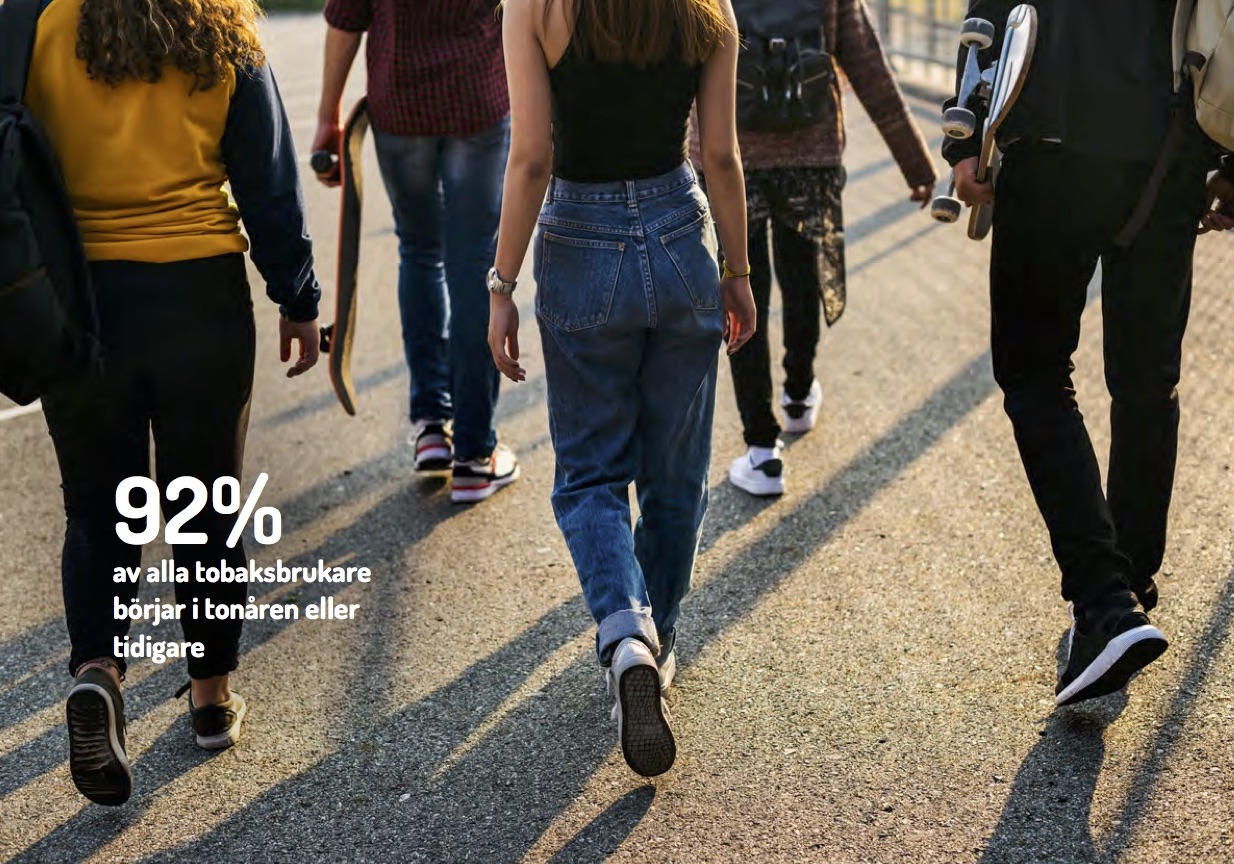
Nine out of ten tobacco users start in their teens or earlier. The most common reason adolescents start smoking or try new nicotine products is the influence of friends. A new report by A Non Smoking Generation shows that most tobacco users begin when they are minors and do so because of peer pressure. The report also highlights that young people want to avoid that pressure in school – eight out of ten are positive towards a ban on cigarettes and snus during school hours.
92 percent of all adult tobacco users started in their teens or even earlier. The new report Youth need tobacco-free school hours, based on a survey of youths´ attitudes towards tobacco, shows that a majority of all tobacco debuts occur between 13-16 years of age, and that the primary cause is the influence of friends.
- 89 % of youth between 14-18 years of age state that the influence of friends is a reason to start smoking
- 75 % state that it is a reason to try new nicotine products such as nicotine pouches and e-cigarettes
The new report also shows that almost 80 percent of adolescents are positive towards a ban on both cigarettes and the oral tobacco product called ”snus” during school hours. Since 2017, when this question was included in the survey for the first time, the public support for tobacco-free school hours has been strong and growing.
– All forms of tobacco use are contagious and the contagion is spreading in our schools. Current law on smoke-free schoolyards only regulates cigarettes and leads to impossible demarcation issues. To protect children and youth from peer pressure and exposure to tobacco there is a need to ban all tobacco products during school hours, says Helen Stjerna, Secretary-General, A Non Smoking Generation.
Apart from peer pressure, almost half of all young people state that mental illness is a possible reason to start smoking, and almost a third state that it can be a reason to try new nicotine products. The report also reveals that both youth and adults lack knowledge about the psychological effects of nicotine.
- 21 % of youth (14-18 years of age) know that nicotine increases the risk of mental illness, and 13 % know that nicotine can cause learning disabilities
- The corresponding numbers for adults (18-79 years of age) are 8 % and 6 %
– It is alarming that young people start using tobacco to deal with mental illness, when the nicotine in fact increases the risk of mental illness. To make schools understand the importance of tobacco prevention we require political decisions and increased knowledge about how nicotine damages youths´ health, education and future, says Helen Stjerna.
Further more, the report shows that only 57 percent of young people receive thorough information about tobacco in school. There are significant knowledge gaps regarding tobacco production and its effects on sustainable development. Merely four percent among adults and six percent among youth know that all nicotine is extracted from tobacco, and few are aware of the massive deforestation and widespread child labour caused by the tobacco industry. When A Non Smoking Generation conveyed this knowledge during a lecture tour last year, 97 percent of students stated that they had received arguments to refrain from using tobacco.
– Sweden is now the only country in the Nordics where tobacco use is allowed during school hours. We appeal to our politicians to take responsibility for the right of all children to enjoy tobacco-free school hours and to receive knowledge that can motivate the choice of a tobacco-free life. Implement a law on tobacco-free school hours and make it mandatory for schools to provide thorough information about tobacco and its effects on both health and sustainability, says Helen Stjerna.
About the survey
Novus did this survey on behalf of A Non Smoking Generation. The purpose was to examine attitudes towards tobacco among youth and the public. The target group was the Swedish public between 14-79 years of age. 1402 web interviews were implemented in April 2021, of which 1071 were done among adults between 18-79 years of age and 331 were done among youths between 14-18 years of age. The attendance rate was 63 percent.
